Cover-up? How shifting policies affect Swiss attitudes toward masks

The issue of face masks has dogged Switzerland’s authorities throughout the pandemic, with every change in policy met by fierce public and political debate. Is it fair to blame the government for any lingering doubts about the need for masks to fight Covid-19?
Back in March, when the number of cases of the novel coronavirus was soaring in the country, the advice from both the Federal Office of Public Health and the World Health Organization (WHO) was clear: healthy people had no use for surgical masks. In the words of the WHO, they would be “wasting a mask” if they wore one.
“The population cannot effectively protect itself with masks,” said Daniel Koch, the Swiss government’s delegate on Covid-19 at the time.
It didn’t take long for mask wearing to become a hot-button issue, with accusations from across the political spectrum that a mask shortage was dictating public health policy.
The public too has been divided on the need for face masks. Many complained the government had not recommended them soon enough. Yet few actually donned them once authorities changed their policy.
Some experts believe that the government’s initial position continues to have an impact on people’s attitudes toward mask wearing, which has since become mandatory on public transport.
Not enough masks
Early in the pandemic, the Swiss government – like the WHO – recommended masks only for those caring for the sick, people in risk groups and those with symptoms. But as the country was reaching the peak of the outbreak, both politicians and the public questioned the soundness of that decision.

More
Should all Swiss be wearing face masks?
It was widely reported that there were then just two-and-a-half weeks’ worth of masks available for the population, which led to a claim that officials were covering up a shortage and “informing people strategically”, as Green Party member of parliament Bastien Girod put it. He, like many others, wanted the government to urge people leaving their homes to wear masks.
The claim proved persistent, convincing nearly 60% of respondents to a Tamedia poll in mid-April, who agreed the government had not mandated mask wearing because the face covering was in short supply. Then, in July, Sunday papers Le Matin Dimanche and SonntagsZeitungreported that records of meetings of crisis management authorities in March showed a mask shortage had influenced the government’s position.
But the public health office disputes this. Spokesperson Yann Hulmann told swissinfo.ch that, although it was true there weren’t enough masks in stock for the entire population at the time, “this [had] no causal connection with the absence of a [generalised] mask-wearing recommendation”.
During the lockdown, when people were being advised to stay at home, there was no need for the widespread use of masks, Hulmann added. “Fewer people were on the move during those weeks and the [recommended distance between people] could generally be kept.”
Limited scientific evidence
Koch, who was head of communicable diseases at the public health office until his recent retirement, has always maintained that the government’s mask policy was based on scientific evidence. According to him, in the early days of the outbreak, studies did not clearly show that masks provided effective protection against the virus.
Sarah Tschudin Sutter, an immunology and infectious diseases expert, confirmed that “the evidence base to support the use of masks, especially for the public, was limited, even more so in March.”
Nevertheless, a team she leads as part of the national Covid-19 scientific task force concluded in an April 20 report that, despite some conflicting evidence in the literature, there was “a risk-benefit ratio in favour of generalised mask-wearing when conducted in association with hand hygiene, whenever social distancing cannot be maintained.” The task force recommended the government introduce a policy along those lines.
With some businesses set to re-open later that month, the issue of face masks was top of the public debate agenda. The mid-April poll by Tamedia revealed 60% of people in Switzerland supported mandatory mask-wearing in public.
But at the end of April, just as lockdown measures were being eased, the authorities stopped short of making the public’s wish come true, opting instead for a recommendation that people wear masks when physical distance could not be respected.
“I’m confident that growing scientific evidence contributed to this decision,” Tschudin Sutter said, adding that coming out of lockdown meant that “new approaches for infection prevention and control were necessary”.
Around the same time, the WHO also switched gears to make a similar recommendation. Meanwhile the Swiss army’s efforts to buy face masks were paying off, with some 35 million masks flooding the market by the end of April, putting an end to the shortage.
A public swayed
Although not everyone was convinced by the government’s initial line that masks offered little effective protection to healthy people, saying this was based on scientific evidence did make a lasting impression.
“The communication early on has resonated strongly,” said Angela Bearth, a risk researcher at the federal technology institute ETH Zurich. “The Swiss have high trust in science and so rely strongly on it, and this is true especially with Covid.”
“So when [the authorities] said that science doesn’t show masks are useful, this sticks with people.”
By June, as more people began leaving their homes to go back to the office or to school, few were wearing masks. Just 6% of passengers at train stations in Switzerland sported masks, despite the government recommendation to don them on public transport.
Bearth and her colleagues polledExternal link people at various points during and after the lockdown. In their final survey, taken just after masks became mandatory on public transport (on July 6), they found non-mask-wearers were more likely than mask-wearers to believe that, according to messages given by public health officials, there was little scientific evidence the face covering protected against the coronavirus.
“We see the change in recommendation in response to the evolving science creating mistrust among some in the population,” said L. Suzanne Suggs, who co-wrote a report on crisis communication for the Covid-19 task force.
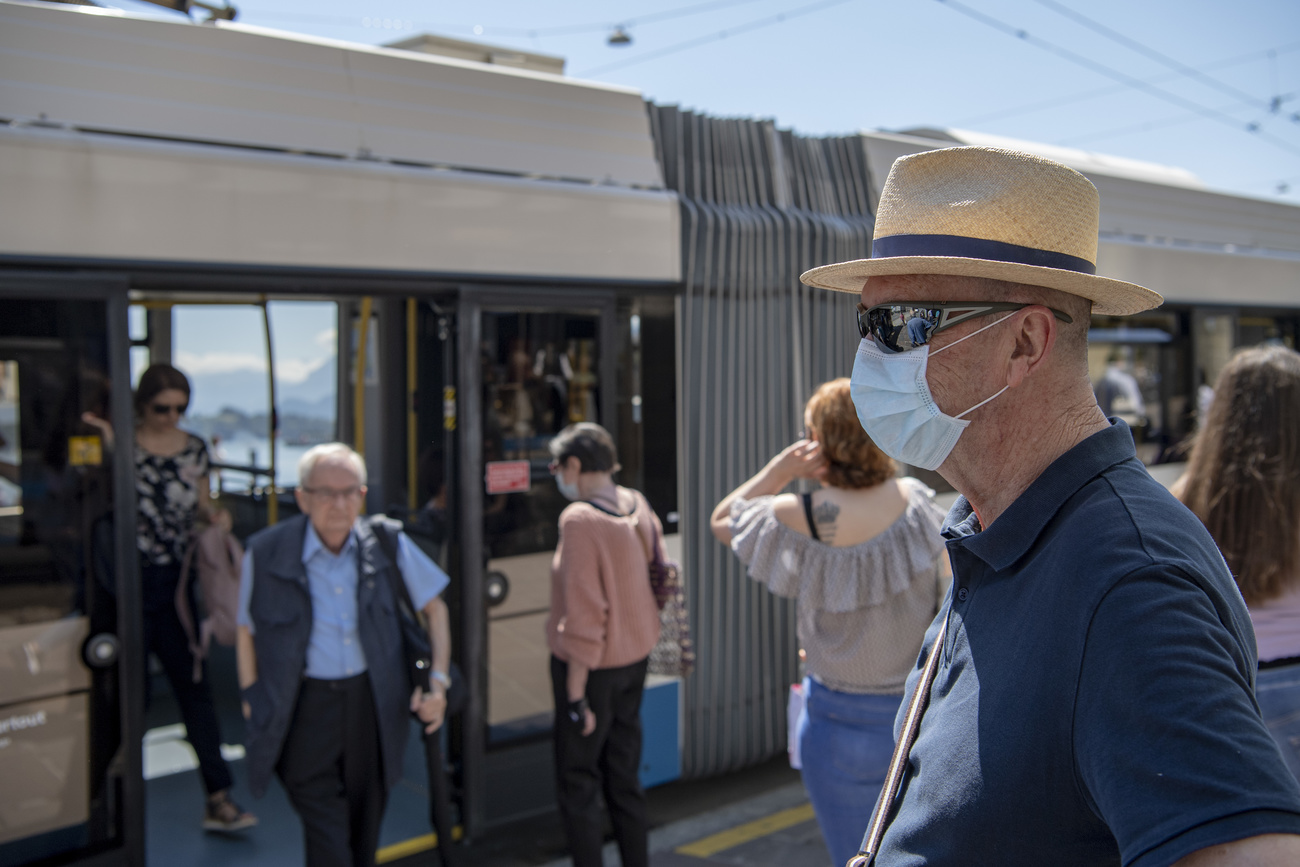
More
Masks declared obligatory on Swiss public transport
Both she and Tschudin Sutter pointed out that once masks became mandatory on buses and trains across the country, compliance improved – not because the Swiss are “blindly obedient”, Suggs added, but “rather because such a mandate communicates just how important masks are”.
According to a follow-up report on masks by the task force published in early July, “[o]ver the past three months, important additional evidence has accrued, which more strongly supports the benefits of public use of face masks”.
By then, Austria, France, Italy and Germany had already mandated mask-wearing in public places, leading even interior minister responsible for health, Alain Berset, to concede Switzerland was out of step with its neighbours.
Seeing such disparities in policy can influence some people’s decision-making.
“For those who are skeptical about mask-wearing, inconsistent recommendations add reason to doubt,” said Suggs, a professor at the Università della Svizzera italiana. “They highlight differences in the epidemiology, in interpreting scientific evidence, or the influence of politics.”
An ‘overrated’ measure?
On the other hand, with masks mandatory on public transport, “many people understand they are now known to be beneficial at slowing the spread of the virus,” Suggs added.
This understanding has led to yet another turn in the debate: if there are benefits to wearing a mask, why not make it mandatory elsewhere? They must now be worn in shops in just a handful of cantons – Jura, Vaud, Geneva and Neuchatel.
Koch, known for his unflappable demeanour throughout the crisis, gave a blunt assessmentExternal link of the debate in an interview with the tabloid Blick in July: “The mask question was overrated from the beginning. The same applies today as three months ago: keeping distance is more important than wearing a mask. And wearing a mask tends to make you lose your distance.”
Yet many in the medical community have voiced support for extending the obligation to wear masks to all places where groups of people gather, including shops. This would make sense from an epidemiological standpoint, the head of the Swiss Association of Cantonal Doctors told Swiss public radio SRF.
According to risk communication expert Bearth, however, wearing masks everywhere could lead to a false sense of security, and to people neglecting other important measures, such as social distancing, a pattern that has been observed in other preventive behaviours.
“It may be helpful to also promote these other measures when communicating with the public, instead of overestimating what masks can do,” she said.
The federal government is leaving it up to cantons to decide how far they should go with mask mandates, although it has encouraged them to impose these in closed public places.
Suggs, the public communications professor, said that unless people “believe they have a responsibility to wear a mask when physical distancing cannot be respected, and feel social pressure to do so, mandates may be needed.”
That, or getting to a point where mask-wearing is easy, socially accepted and socially expected, Suggs said, adding that Switzerland is not there yet.
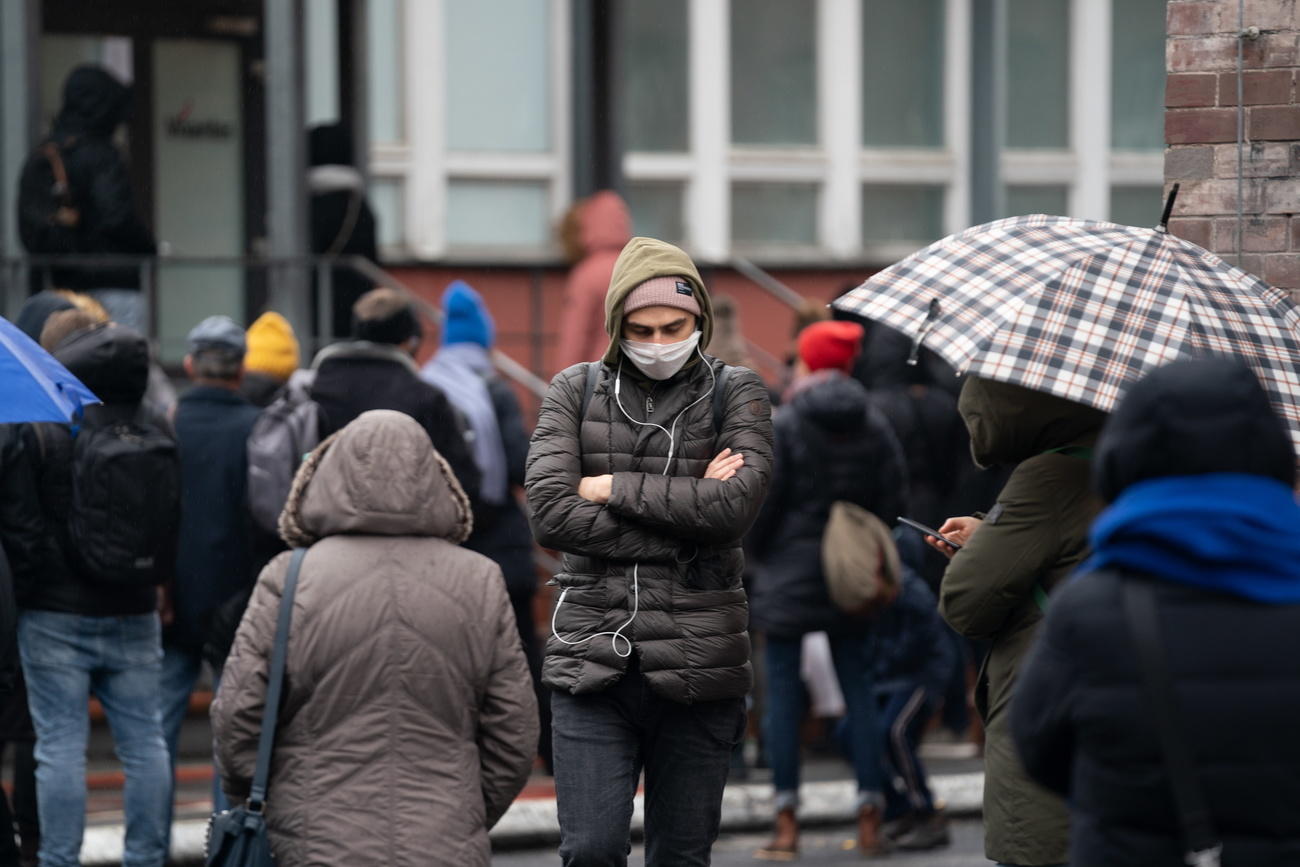
More
Why the Swiss are reluctant to wear face masks

In compliance with the JTI standards
More: SWI swissinfo.ch certified by the Journalism Trust Initiative

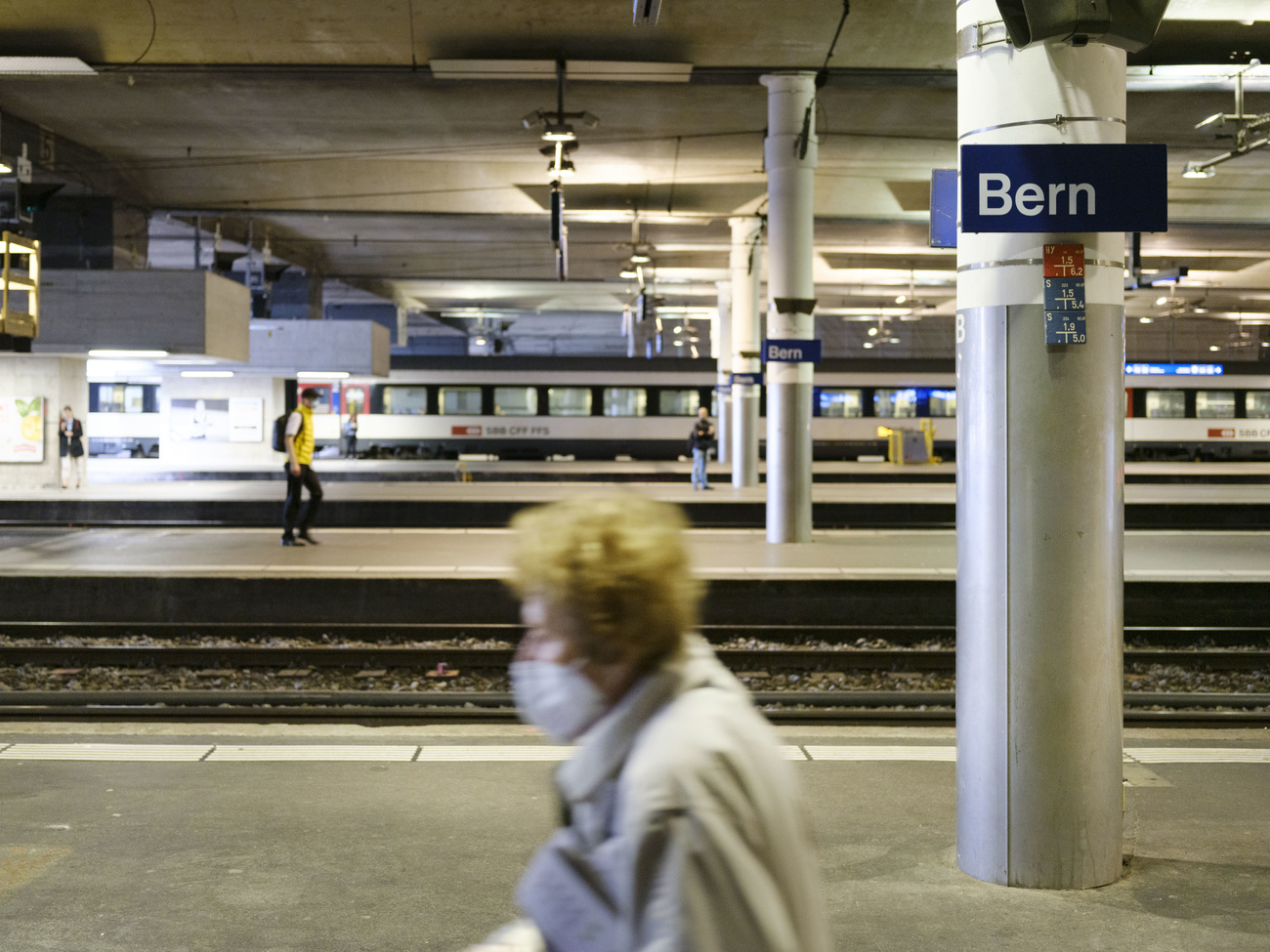

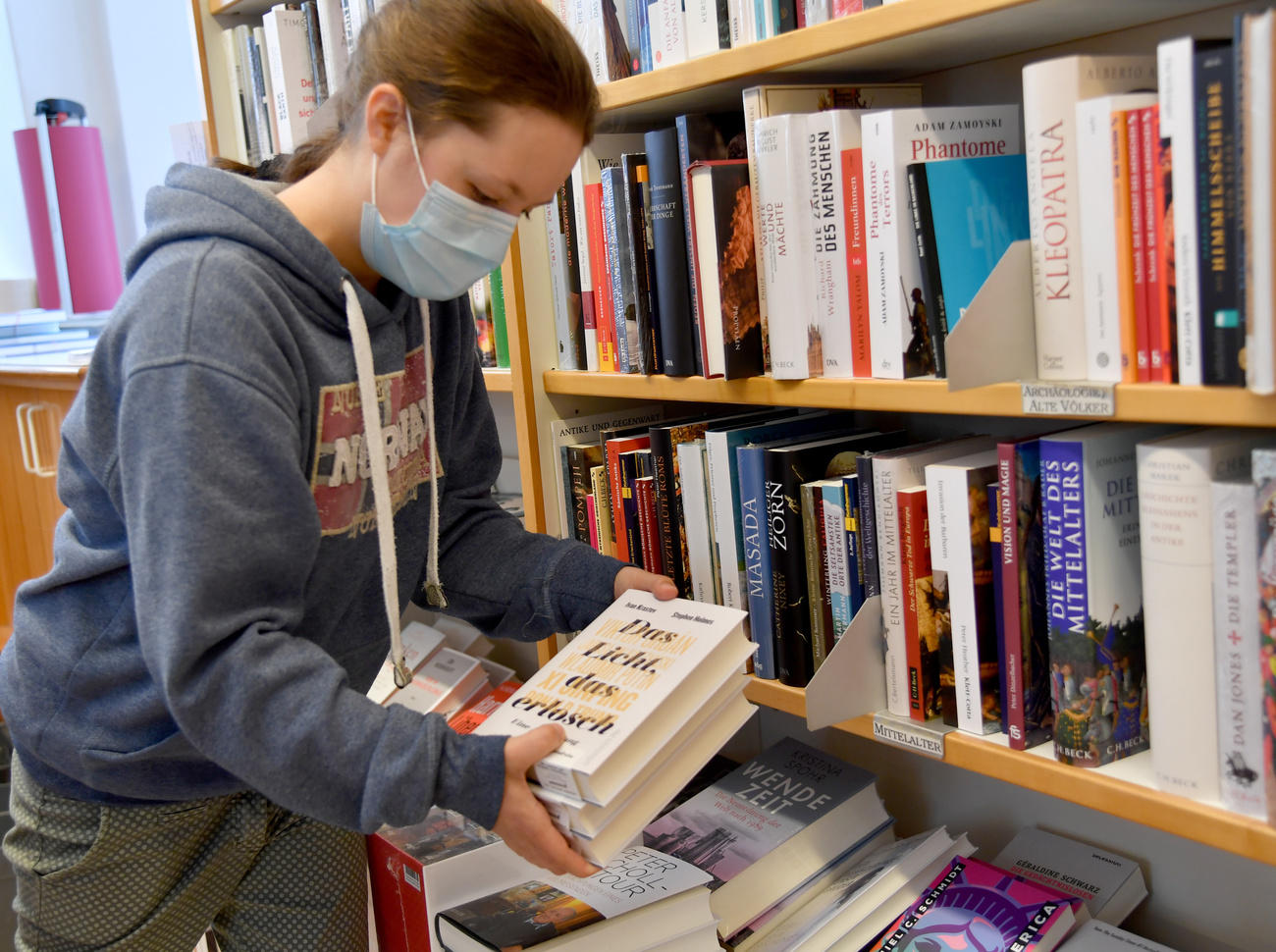
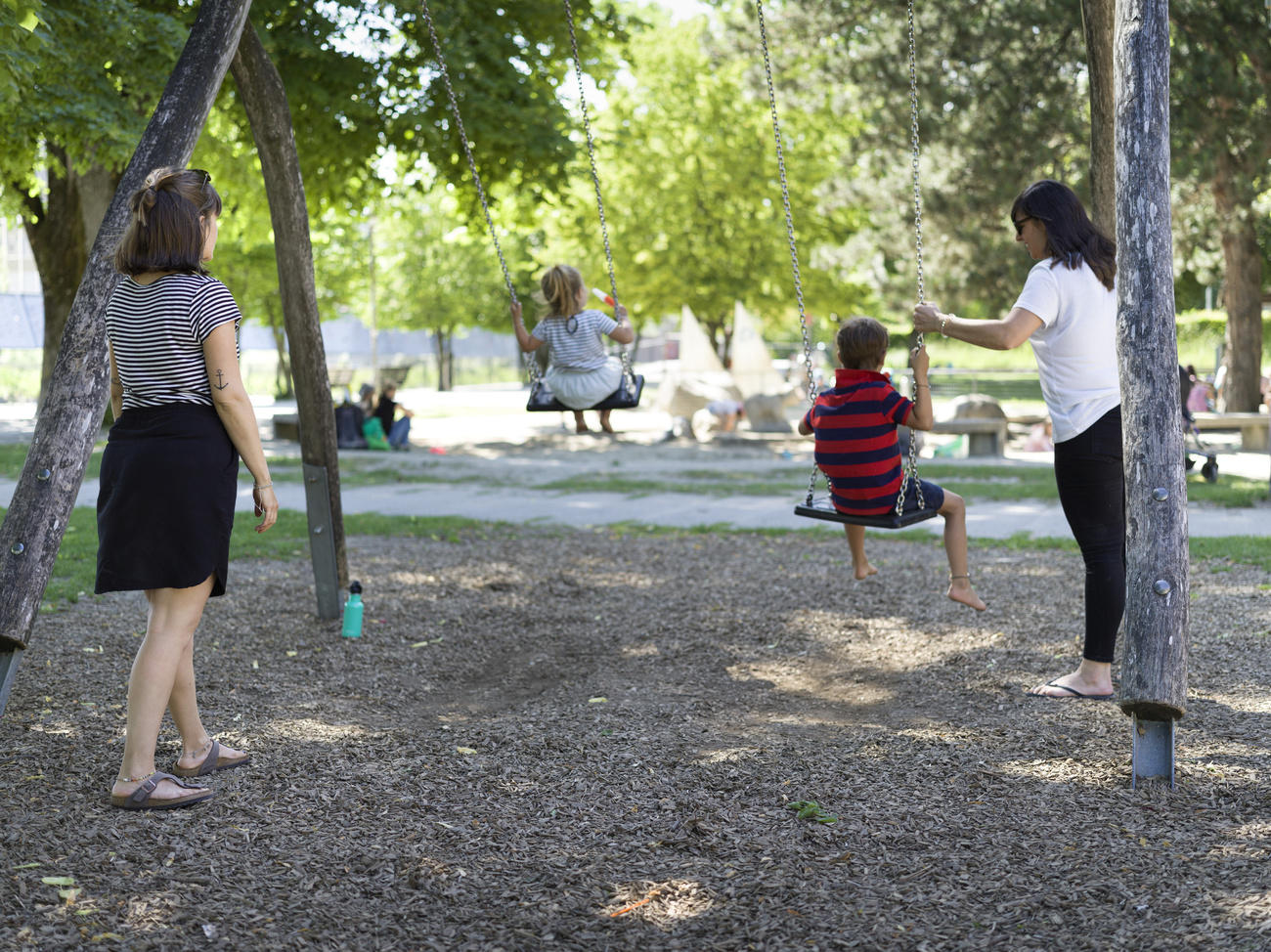
Join the conversation!